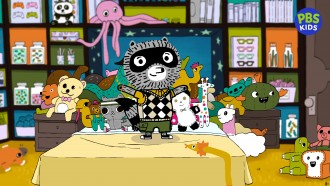PBS KIDS’ Premiers Groundbreaking Series Focused on Autistic Main Character
PBS KIDS’ Premiers Groundbreaking Series Focused on Autistic Main Character
October 31, 2024By AUTUMN GRAY

Animated raccoon star and friends portray spectrum as part of humanity
The latest PBS animated series for young children is being brought to you by an autistic raccoon in an argyle sweater vest, with a penchant for collections. His name is Carl, and his show, Carl the Collector, is the first with a main character on the autism spectrum to air on PBS KIDS. It is set to debut November 14 in English and Spanish.
The 2D animated series, designed for ages 4-8, was created by New York Times bestselling illustrator and author Zachariah Ohora. With its relatable stories and heart-felt messages told through animal characters on the autistic spectrum, Carl the Collector is intended to showcase and celebrate our differences and commonalities, emphasizing that every individual has something unique and valuable to offer society.
In the show, Carl and his extensive collections—including plushies, bottle caps, bouncy balls, fake mustaches, and pet rocks—are at the center of Fuzzytown. He shares the screen with his best friend, Sheldon, an empathetic beaver; Lotta, a quiet and self-assured fox, who is hypersensitive to loud sounds, powerful smells, and certain food textures, and has exceptional talents in art and music; twin bunny sisters Nico and Arugula, who are on a quest to define their individual identities; and Forrest, a hyperactive and impulsive squirrel always ready for adventure. In each episode, everyone works and plays together and solves problems around the neighborhood. Along the way, they discover what makes each of them who they are.
“It’s not just a show about autism,” Ohora said. “It’s also about self-identity and social and emotional learning techniques of how to deal with other people – all the classic kindergarten stuff like learning to share and learning executive function (and processing feelings), along with what makes me, me, and what makes you, you. In that regard, I think it’s for everybody.”
About one in 36 8-year-old children has been identified with autism spectrum disorder (ASD), which occurs four times more often in boys than girls, according to 2023 estimates from the Center for Disease Control’s Autism and Developmental Disabilities Monitoring Network.
ASD is a brain-based disorder that is characterized by social communication challenges and restricted and repetitive behaviors, activities, and interests, which vary widely from person to person – hence a “spectrum,” according to the Autism Science Foundation. Typical ASD behaviors include excessive worrying, repetitive motions, insistence on routines, resistance to change, and obsessive-compulsive tendencies.
In about 40 percent of cases, those with autism have cognitive disability. Others are geniuses, excelling often in science, math and music. Albert Einstein, Thomas Jefferson, Emily Dickenson, Michelangelo, Steve Jobs, Bill Gates, and Steven Spielberg are all believed to have had ASD.
Many people on the spectrum enjoy collecting things. Though Ohora said neither he nor anyone in his family has been formally diagnosed with autism, the idea for the series began in part with his love for raccoons and a shared love of collecting with his son.
“I’ve been a lifelong collector,” said Ohora, who lives in Narberth, Penn., with his wife and two children. “I have 4,000 records sitting around in my studio, and I collected comic books as a kid and just have a collector mentality. So, honestly it started out just being, this is what like to do.
“It got to a frenzy point where we were collecting containers for collections we didn’t even have for the future – you know like the old-school organizers you see in your dad’s garage that have all the little clear drawers for screws and stuff. I totally identify with that OCD (obsessive compulsive disorder) joy.”
Due to common visible autistic traits, many with ASD experience stigma. This means they can be subjected to ignorance, prejudice, and discrimination, all of which may impact their well-being and ability to thrive, according to the National Institutes of Health (NIH). Ways to decrease stigma may include “’autism friendly’ spaces, positive media representation, educational and psychosocial training for the public and professionals, as well as cultural and systemic shifts that foster inclusivity and recognize neurodiversity,” the NIH states.
In this way, Carl the Collector may help change the narrative about people with ASD.
“The more exposure (people) have to the whole spectrum of humanity, the more understanding and empathy everyone’s gonna have with people’s struggles, and it demystifies any of the fears of the unknown or people being different … and that’s good for everybody,” Ohora said.
Plus, he said, “If you’re a neurodiverse person seeing yourself on screen, there’s plenty of studies that show that if those are positive portrayals of who you are, that’s great for your self-identity and image.”
To ensure authentic representation of ASD, the production team includes neurodiverse writers, production staff, animators, advisors*, and voice talent. Any animated characters with autism are voiced by people with autism, and many story lines are generated from real-life experiences.
“We’re really concerned with getting things right,” Ohora said.
PBS has ordered 40 episodes of Carl, each composed of two 10- to 12-minute shorts. They begin airing weekdays, November 14. Check local PBS listings for showtimes. Plushies, toys, and, of course, collectibles related to the show are all being planned.
*Experts serving as advisors for Carl the Collector include Dr. Geraldine Oades-Sese, a licensed psychologist, children’s book author, and former adjunct associate professor of pediatrics at Rutgers Robert Wood Johnson Medical School; Dr. Stephen Shore, an autistic professor of special education at Adelphi University and adjunct professor at New York University Steinhardt School of Culture, Education, and Human Development; and Deborah Farmer Kris, educator, author, parenting columnist, and consultant for PBS KIDS for Parents.

